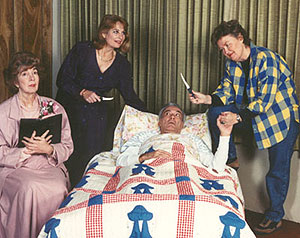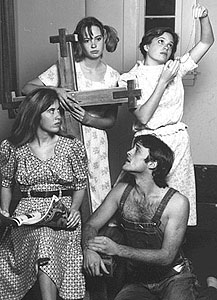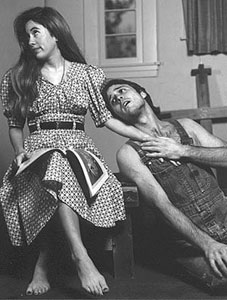
|
On Daddy’s Birthday (Gateway Players, 1991)...an explosive nightmare which uses a horror, buried many decades in the drama’s past, to trace a chain of betrayal, guilt and loyalty between three sisters and their monster of a father. Add love to those emotions, because in a curious way it figures into the complex of relationships and conspiracy... What makes the first act is a device that has each of the sisters shadowed by her former self, the pretty child she carries around inside. In an inspired bit of staging from Locke, who also directed, women and girls interact—caressing, shielding, sharing knowing looks. And when a nerve is struck, when the years are forgotten, a present-day sister may address, if only for a moment, her Depression-era sibling. It works beautifully. Sacramento Bee Although On Daddy’s Birthday has sisters with the same names and same basic characterizations as in Rose Jewel and Harmony, it is a very different family. These same names and characterizations were first introduced in Tracks during the 1930’s Depression and now they are explored more fully in the present. What became of those girls heading west to L.A. with their brutal preacher-father Clyde Starr? Sidenote: The Clyde Starr of Tracks and On Daddy’s Birthday is Clyde Moon in Rose Jewel and Harmony. He was created Clyde Moon because I loved the names of his daughters Violet Ruby Moon, Rose Jewel Moon and Marguerite Pearl Moon. Houghton Mifflin demanded I change his name for Tracks because they feared readers would confuse my character with the notorious 1980’s Reverend Moon. (Balderdash! But Houghton held the gun.) When I wrote Rose Jewel and Harmony I changed the name back from Starr to Moon because Rose Jewel Moon is so suitable to this character (and because I now held the gun again). Then when I wrote On Daddy’s Birthday I went back to Starr because the harsher name better served this much harsher play. As Monroe’s mother tells him, “Violet Ruby Starr is as cold as her name and the man who marries her will freeze to the bedsheets.” 
Pictured from left to right are Hazel Rockman as the pious and vain Rose Jewel, Bobby Stewart as the Hollywood legend Jane Randolph, nee Violet Ruby, and Benne Alder as the plain, stalwart Marge. Their plans are patent for their paralyzed father, the Reverend Clyde Starr, played by Harvey Farr. Reverend Starr was a brute of a man who did nasty things to his girls when they were in their teens in Depression Oklahoma. The game is not merely when they will dispatch the old man, but who will do the dispatching. 
Above is a photo of the young sisters on the day that Violet Ruby (seated) passes Daddy on—like Mama’s chain—to the good, plain Marge holding the cross. Rose Jewel covets the chain, but it is not to be hers. The Sacramento Bee review pointed out very sagely, “Besides depicting how one man enslaved a succession of girls, Locke portrays how women help men enslave other women.” In the first act these young actresses shadow their older counterparts, wordlessly holding their hands and sharing their complex of emotions, the innocent child within each old woman. It is not until Act II that the young girls take the stage in their own right and play out their original betrayals of each other in the year 1934. Act II has actually been performed in colleges as a complete one-act play titled Mama's Chain. In this production Violet Ruby was played by Sheri Norbury, Rose Jewel was played by Melissa Yearta, and the victim Marge was played by Shawna Hensley. The young man is the lovestruck Monroe Monroe Monroe, one of the main characters in Tracks at just this age in Depression Oklahoma. He is played here by Jonathan Coder. 
The teenage Violet Ruby is bored with Monroe, but she knows she must use him if her plan is to succeed. It is not until the second act of the play that we go back in time to this day when Violet Ruby’s action will determine the fate and character of her good sister Marge. And it is not until present day Marge, at the very end of the play, remembers this action that she turns to her twin, the pious, stupid Rose Jewel and makes her take responsibility for her complicity with Violet Ruby. On Daddy’s Birthday was nominated for Best Original Script and for Best Production of an Original Script by the Sacramento Area Regional Theatre Alliance. Listen to the 8-minute clip of a tape recording made by my sweet mom and aunties at my grandma's bedside in 1980. Grandma lay dying and the five sisters sang to her the hymns, remembered from their childhood, to carry Grandma to her "home on God's celestial shore." The original 30-minute recording obsessed me for weeks, and I listened through earphones in my own bed each night, tears rolling down my cheeks. Eventually, the plot and characters of On Daddy’s Birthday sprouted. But I was wise enough NOT to invite my mom and dad or any of the aunties to come and see this play; it would have appeared to them a desecration. And, gee, I guess it IS a desecration; my own betrayal of the intimacy and faith of my mom and aunties who shared this recording with me never imagining that I would turn it into something so ugly. But gee, again; I am a playwright; I want to portray not just sentimentality, but drama. And On Daddy's Birthday is indeed high drama. Rereading the play now in 2013, twenty years after the production pictured above, I was stunned again by each line of betrayal from the sisters, young and old; it is the sign of a good play that even the playwright can be held entranced and breathless, wondering what will happen next. To read On Daddy's Birthday
Copyright © 2004 Robert Locke, rev. 2013 |